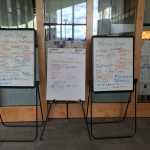Today, Ithaca College professor Cynthia Henderson came to Flora Rose House to hold a workshop on racial discrimination and race relations in America. Though the topic is a very relevant one, especially in today’s world, I was unpleasantly surprised to see that only one other person showed up for the workshop. All I can say is that everyone else really missed out because it was one of the best events I have ever attended.
The three of us (the other Rose scholar, Cynthia, and I) began by writing on three different boards the first things that popped into our heads relating to “black people”, “white people”, and “privilege”. Attached is a photo of what each of us wrote down, and the circled items were things that we felt have brought us, or people that we know, pain in the past. Some of the things that I circled included the words “discriminated”, “affirmative action”, “black-on-black crime”, “appropriation”, “Black Lives Matter”, and “misogyny”.
This activity was extremely important because it not only gave me the chance to share how certain things have brought me pain in my life (such as intersectionality, #AllLivesMatter, and colorblindness), but it also allowed me to expand on why they’ve done so. But on top of that, I was able to hear the feelings of the other Rose Scholar in attendance (who happened to be White), feelings on race issues and how she felt stereotyped against at times, a perspective I never thought to take. Sometimes, it’s so easy to get so wrapped up in a cause that we forget other individuals who are indirectly being affected by it or who are indirectly being prejudiced against as well, and this activity enabled me to recognize this and make plans to amend my way of thinking.
Following this, we were given individual mini notebooks to do a modified Privilege Walk, where we were asked a series of questions, to which we either wrote a minus sign if it didn’t apply to us or a plus sign if it did. An example of such a statement was: “If you learned about your ancestors in elementary social studies class, take a step forward/write a plus sign.” By the time we had completed the activity, I had a total of 12 pluses and 13 minuses, while the other Rose Scholar had 21 pluses and 4 minuses. This was an observation I was half expecting, yet I was still surprised to see such a divide between the two of us….And that was only after 25 of such questions. Something Cynthia was sure to remind us of, and something that I really appreciated during the duration of the workshop, was the fact that someone’s privilege as a White person, or someone’s discrimination as a Black person, isn’t a result of our own doing, but rather a result of the way society has unfortunately been structured for centuries. That point probably resonated with me the most, even though I already knew that it was the truth: being African-American is not my fault, just how being born White in a country that caters to White people is not the fault of every White person in America.
Something else that I particularly enjoyed about the workshop was the last activity that Cynthia had us do: taking what we’d written down on the boards and writing a poem about an race-related event that we’d experienced in our lives that we hadn’t said anything about at the time. I won’t share what I wrote in this blog post, but being in such an intimate setting with just Cynthia and GRF Antonio gave me the confidence I needed to share three events (of many) that had occurred that I’d never had the courage to talk about. And that’s something that I’ll honestly treasure for the rest of my life. As a writer, I know the importance of writing things down and the emotional release that accompanies doing so; that’s why I’m so thankful that Professor Henderson allowed me to keep the notebook, so that I can continue this practice of reflecting on my experiences and allowing them to shape me into a better person.
The last thing I did before I left was ask Cynthia few questions that I had, of which included what I was supposed to do about my younger brother and cousin who will both start college in the fall. As young black men, they are in constant danger of having their lives taken from them for simply walking down the street and/or for simply being black, and I told her that sometimes I feel personally responsible for “waking them up,” so to speak, so that they’re aware to the differences that will exist between white people and black people in college–from blatant racism to smaller microaggressions. “My mom always used to say to me, ‘Each one reach one, each one teach one,'” Cynthia said in response to my question. And by that she meant that as each Black person scales a hurdle or achieves a milestone in life, it’s important to reach back and help bring along our brothers and sisters, never forgetting to only take on what we can handle, but always striving to advance the successes of our race in this country.

